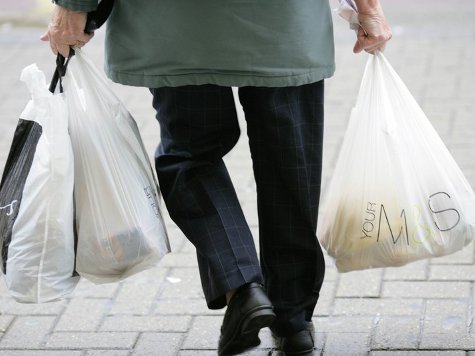Hide your kids, hide your wife: the scourge of the grocery market remains on the lam. Fortunately, courageous legislators have assumed the burden of this great responsibility to ban plastic bags nationwide and, in the process, throttle the manufacturing sector.
San Francisco’s Board of Supervisors earned the ignominy in 2007 of introducing the first legislative proscription of plastic bags in supermarkets and chain pharmacies. Last month, the same Board extended the landmark ban to all retail establishments and restaurants. North of 50 municipalities have taken similar action to eliminate the bags in the interim, either through an outright ban or taxes on those businesses that use them.
“This effort’s no longer confined to San Francisco,” remarked an environmental politics watchdog with whom Capitol Confidential spoke. “How any nanny state legislation with roots in the City by the Bay can be seen as a legitimate tactic to be pursued in places like Texas is a truly frightening commentary on the nation’s political landscape.”
By Big Government’s count, three state legislatures are considering statewide bans on these 100 percent recyclable shopping bags. Another 90 jurisdictions still are considering mirrored legislation.
Bag the Ban, an industry project to educate the public on the various proposed bans incubating throughout the country, estimates that more than 10,000 Americans are directly employed by the manufacturing or recycling of plastic bags. The United States is the leading manufacturer of these easily-recycled bags, while China produces the reusable — and yet not recyclable — alternatives.
The nanny state fad, which notched an important victory late last year in Seattle, is predicated on the notion that plastic bags are irresponsibly produced and rarely recycled. Yet neither warped argument is grounded in reality.
“Moving consumers away from plastic bags only pushes people to less environmentally friendly options such as paper bags, which require more energy to produce and transport, and reusable bags, which are not recyclable,” the vice president of sustainability and environmental policy for Hilex Poly, the company who launched the Bag the Ban group, told the New York Times of the Seattle ban.
An analysis by the United Kingdom’s Environment Agency revealed in 2006 that plastic bags have a lighter environmental footprint than paper alternatives.
American plastic bags, which represent a majority of those in circulation in American markets, are overwhelmingly the product of natural gas, not oil. 85 percent of the raw material used for the bags are the products of natural gas. And, according to figures by the Environmental Protection Agency, plastic bag recycling has doubled in the last 9 years. 900 million pounds of bags were recycled in 2010 alone.
“Proposals to ban plastic bags amount to an attack on green American manufactures and threaten the livelihood of tens of thousands of working families,” Bag the Ban’s website reads.
Those bills — and the manufacturing, use and recycling figures they willfully discount — have pushed responsible manufacturers and industry groups to fight back. Jobs and the legitimate overburdening of the environment are on the line, they say.
The truth is that you can’t hide from these proposals anywhere. It’s why the group has begun soliciting voters in Maryland, Washington, Colorado, Virginia, Texas, Massachusetts and Illinois to sign petitions against them.

COMMENTS
Please let us know if you're having issues with commenting.